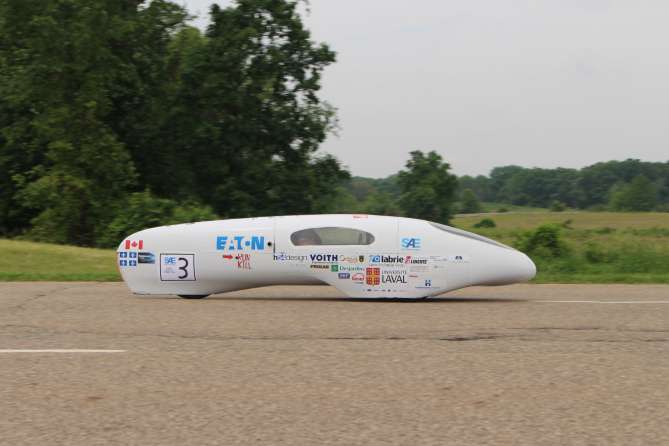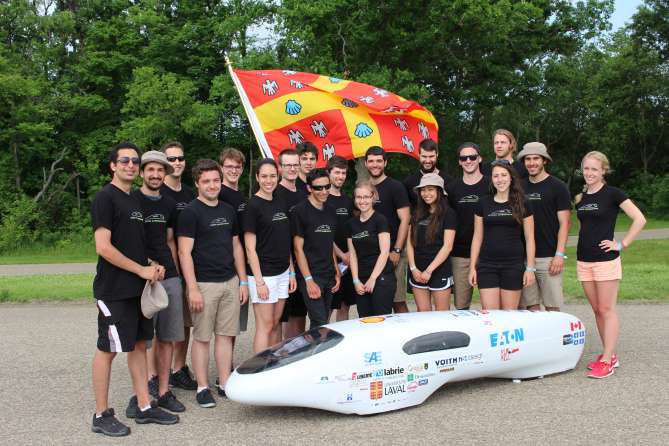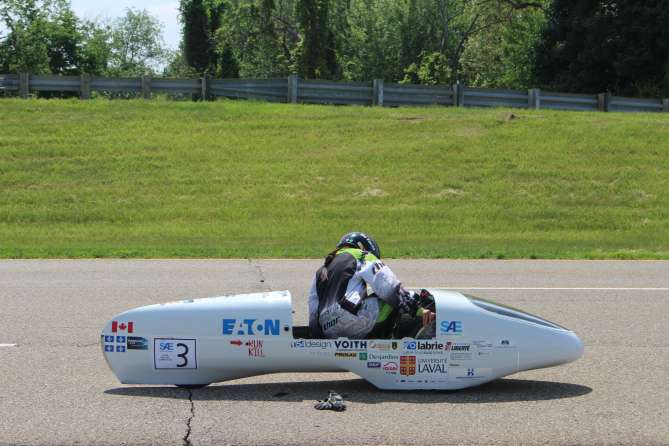SAE International, which is a global association of engineers and related experts in aerospace, automotive and commercial-vehicle industries, held its .36th SAE Supermileage competition in Michigan last month.
The event represents two beneficial outcomes—encouraging students toward careers in science, technology, engineering and math; and generating public awareness of high-mileage fuel economy.
Meeting the competition criteria of a single-occupant vehicle with a one-cylinder, four-cycle engine, the overall winner turned out to be a team from Canada. The winning student team is from Quebec's Université Laval. This marks the school's second consecutive win.
The team from Université Laval from Quebec achieved 2098 mpg with their student-designed and -built car. They received a total score of 2453 (2098 mpg plus its design report score of 355).
There were 23 collegiate teams competing, said the SAE release. The Laval team beat 17 U.S teams and five from Canada. Criteria included fuel economy and car design.
"Participants are encouraged to use advanced materials and technologies, as well as their design creativity and imaginations," said Eaton, a power management company, which has hosted the event since 1980.
Writing about the Université Laval's second straight victory at the event, Danny King in the Autoblog said "the team produced a vehicle that attained a fuel-efficiency rating from a one-cylinder engine of 2,098 miles per gallon. And they even reused last year's vehicle shell."
Inhabitat called the single-seater car an "ingenuous feat of engineering."
The news release from SAE talked about the refinements that team put into their 2015 car. This time around, they sought to reduce the weight and did so by two to three pounds. They made changes too in the clutch system, electronic system, and fuel line, to get better reliability. Team manager Bruno Désaulniers said, "We also changed the rear sprocket to get a better ratio between the engine and the rear wheel."
Désaulniers also talked about what matters in preparing to compete. "The driver can make a very big difference in the result, but also a good race strategy is extremely important. We calculate at what speed the driver must start the engine to reduce energy loss."
They had a new driver and she had been advised by their former pilot who had already made the run. Désaulniers said they "wasted no time to know and understand the track and when to accelerate."
About the team: They are part of the university's Alérion Supermileage. This is a project run by students in the institution's Faculty of Science and Engineering. The school describes the design of its Faculty of Science and Engineering as a multidisciplinary environment, with a combination of pure and applied sciences and engineering The project's objective is to build the most fuel-efficient single-seat vehicle possible.
The team won $1500 and will be recognized this October at the SAE 2015 Commercial Vehicle Engineering Congress in Illinois.
Two other college teams achieved more than 1,000 mpg. Brigham Young University was second with a total score of 1609 (1244 mpg and 365 for design). Northern Illinois University, DeKalb, was third with a total score of 1,400 (1,057 for mpg and 343 for design).
"The students are so impressive with their ingenuity and creativity. What they accomplish year after year with this competition is truly amazing," said Staci Kroon, president, Eaton Vehicle Group. The competition was held at Eaton's Proving Grounds in Marshall, Michigan. This is a 9.6-mile course – six times around Eaton's 1.6-mile test track.
Brigham Young University took first place, meanwhile, in the "Endurance" category.
Freudenberg-NOK was a Gold Sponsor of the SAE Supermileage event, and offered its Energy Saving Seals (ESS) seals, to teams in the competition.
Dr. Luis Lorenzo, senior vice president, technology and Innovation, Freudenberg-NOK, said, "if all of the engine, transmission, axle and bearing seals on all light vehicles on the road today were replaced with low friction seals, it would save about 2 billion gallons of total fuel annually."
"We're constantly pursuing technologies that increase efficiency, so a competition in which we can help students squeeze every mile per gallon possible out of their vehicle is exciting," said Mike Rowe, strategic product development manager, Freudenberg-NOK.
More information: www.alerionsupermileage.com/english/
© 2015 Tech Xplore


























